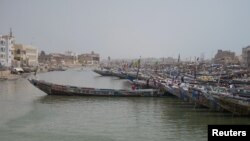Saint-Louis, Senegal’s historic center for fishing, has faced many troubles over the past decade. Sea erosion from climate change washed away homes, forcing moves. Thousands of foreign industrial trawlers, many of them illegal, snapped up vast amounts of fish, and local men in small wooden boats couldn’t compete.
The rig was the final straw for Saint-Louis, pushing it to the brink of economic disaster, according to locals, officials and advocates. The benefits promised from the initial discovery of energy off the coast haven’t materialized
As early as 2018, Saint-Louis residents say, they were warned they would lose access to some of their favored fishing waters. Installation of the breakwater, the area where the platform sits began by 2020.
To make way for the drilling of some 15 trillion cubic feet of natural gas (425 billion cubic meters) discovered off the coasts of Senegal and neighboring Mauritania in West Africa in 2015, access to fertile fishing waters was cut off, with the creation of an exclusion zone that prevents fisherman from working in the area.
At first, the restricted areas were small, but they expanded to 1.6 square kilometers (0.62 square miles), roughly the size of 300 football fields, with construction of the platform that looms about 6 miles (10 kilometers) offshore.
BP is the operator and investor, owning nearly 60% of the project in Senegal and Mauritania. The deal promises to create thousands of jobs and provide electricity to a nation where approximately 30% of its 17 million people live without power.
Traditionally, many women make a living processing fish, while the men catch it; sons, husbands and fathers spend weeks at sea. But with the restrictions, families couldn’t feed their children or pay rent. They begged for leftovers from neighbors. Some were evicted.
Senegalese officials and the gas companies say people should be patient, as jobs and benefits from the gas deal will materialize. But locals say they’ve been stripped of their livelihoods and provided with no alternatives. That's driven some women to prostitution, an industry that’s been legal in Senegal for five decades but still brings shame for those who break cultural and religious norms.
For one family of seven, hitting bottom came when they were evicted. The father, a 45-year-old fisherman, lost his job. There wasn’t enough food to feed the five children, ages 2 to 11.
The mother tried washing clothes and other jobs, but at less than $10 a day, it wasn’t enough. The family moved in with relatives and she had nothing to feed the children before school each morning.
“I’m obliged to find money through prostitution,” she told the AP, her shoulders hunched and voice weary in a hotel room where she wouldn’t be seen by her husband or friends.
“When we use the money, when my children eat the food I cook from that money, it’s hard,” she said.




